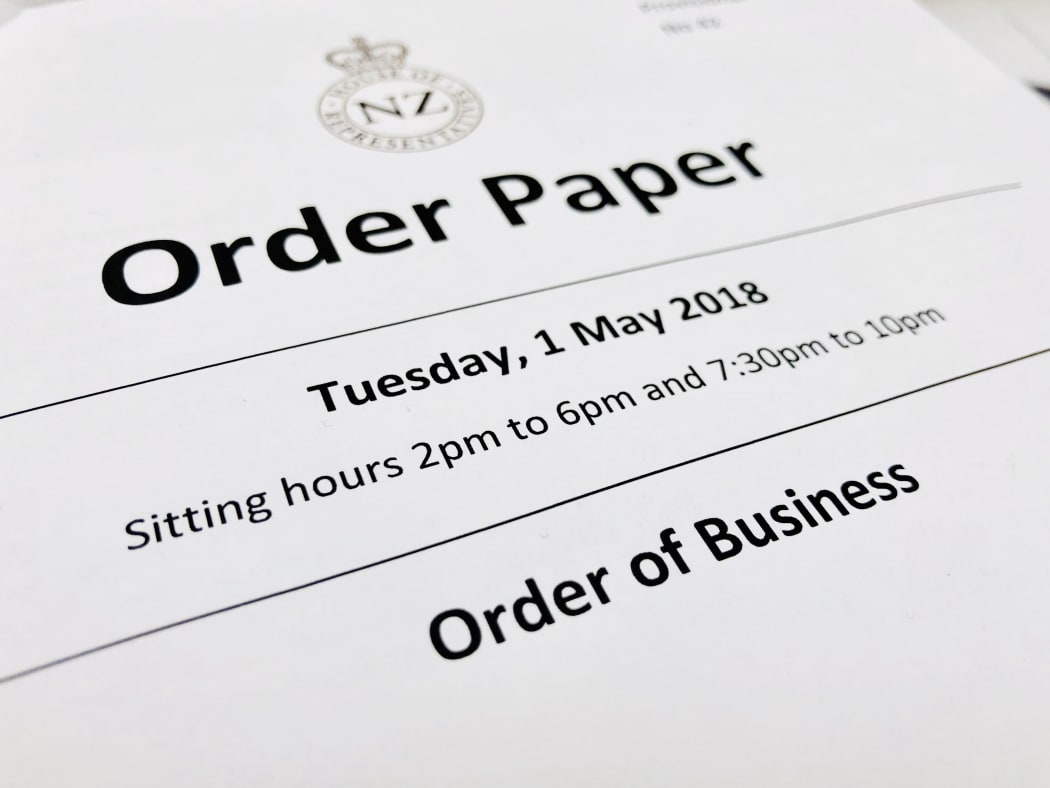Each sitting day normally starts off with question time after which MPs move on to “Government orders of the day” which is just another way of saying they work through proposed legislation.
Here’s what they plan to do this week (May 1 - 3).

Photo: VNP / Daniela Maoate-Cox
MPs are required to be at Parliament for scheduled sitting days, so called because they sit in those green chairs for the day. An agenda known as the Order Paper is published online each sitting day outlining what business the House plans to get through but there are more items on the list than there is time so below is an indication of what they’ll attempt to get through.
Tidying up the accounts (Tuesday)
What:
-
MPs will finish up ten hours of debate on the Appropriations (2016/17 Confirmation and Validation) Bill which is in committee.
-
The first and second readings of this bill are done without a debate in the House and it doesn’t go to a select committee for consideration. Instead there is a debate in the Committee of the Whole House stage known as the Annual Review Debate. The ten hour debate is split into sections; each section is led by the chairs of select committees which compiled the annual review reports.
The sections for debate are:
-
Economic Development and Infrastructure Sector
-
Education Sector
-
Environment Sector
-
External Sector
-
Finance and Government Administration Sector
-
Health Sector
-
Justice Sector
-
Māori, Other Populations and Cultural Sector
-
Primary Sector
-
Social Development and Housing Sector
The House is up to the two last sectors.
Why:
This bill is part of the financial cycle of Parliament. At the start of the financial year the Government releases its budget (which is where money will be spent) and towards the end of the financial year the annual reviews check up on how the money was spent. The bosses of government funded entities have already been quizzed on their performance by select committees and now its a chance for MPs to defend or attack the past year’s spending.
Weapons dealing (Tuesday)
What:
-
The second reading of the Brokering (Weapons and Related Items) Controls Bill.
-
The Bill will set up a way to regulate the brokering* of weapons and related items by New Zealanders or NZ based entities overseas particularly where there is a risk of weapons being transferred to “illegitimate users or undesirable destinations” like a conflict zone.
*Brokering involves negotiating, arranging, or facilitating the transfer of weapons and related items from one foreign country to another. -
The second reading of a bill normally takes place after it has been considered by a select committee which sometimes includes suggested changes in its report back to the House. The report on this Bill from the Foreign Affairs, Defence and Trade Committee which included amendments can be read here.
Why:
-
New Zealand ratified the Arms Trade Treaty in 2014 which regulates the international trade in conventional arms (for example rifles, sea mines or bombs) and this Bill will help New Zealand meet its treaty obligations.
Power to the Commerce Commission (Tuesday)
What:
-
The first reading of the Commerce Amendment Bill
-
Makes a couple of changes including introducing a competition studies regime, increased regulation of airports if required, and updating the alternative enforcement mechanisms available to the Commerce Commission.
Mining Permits (Tuesday)
What:
-
The first reading of the Crown Minerals Amendment Bill which will make changes to the Crown Minerals Act 1991.
-
The bill clarifies rules and powers around permits for exploration and drilling. It’s not dealing with the Government’s announcement to stop granting new deep-sea oil and gas exploration permits.
Voting online (Tuesday)
What:
-
The first reading of the Local Electoral Matters Bill. They will probably run out of time to finish this first reading on Tuesday and may continue it on Thursday.
-
It’s an omnibus bill meaning it will make changes to more than one Act. One of those changes is to “support the conduct of trials of novel voting methods” like online voting.
First speech: Nicola Willis (Wednesday)
What:
-
National MP Nicola Willis will give her maiden speech after question time.
-
New MPs get 15 minutes to give their first speech in the House in which they typically mention their goals, upbringing, and beliefs. The speeches are often referred to by MPs when they give their valedictory speech at the end of their term.
General debate (every Wednesday)
What:
-
Twelve speeches of up to five minutes in length after question time on Wednesdays in the House.
-
Bigger parties get more speeches and this week the time is split like this:
-
National: six
-
Labour: four
-
New Zealand First : one
-
Greens: one
Why:
-
The general debate is a chance for MPs to bring up issues that would otherwise not come up before the House making it a wide ranging debate. Sometimes parties take a coordinated approach and speak on the same issue but there’s no rule that they have to.
Member’s Day
Every alternate Wednesday in the House time is devoted to bills by members who are not ministers like Opposition MPs and backbenchers. They’re called member’s bills and are drawn at random from a biscuit tin. Yes really. This week there are a bunch of bills up for first readings.
-
The continued first reading of the Health and Safety at Work (Volunteer Associations) Amendment Bill. Under the Health and Safety at Work Act volunteer associations that do not employ people are excluded from the rules applied to a person conducting a business of undertaking or PCBU. This bill would mean that volunteer associations that do employ people for less than 100 hours a week would not be considered a PCBU. Under the Act, PCBUs are responsible for the health and safety of their employees where reasonably practical, like making sure the workplace isn’t a health and safety risk.
-
The first reading of the Administration of Justice (Reform of Contempt of Court) Bill which reforms the law of contempt in New Zealand courts.
-
Oaths and Declarations (Members of Parliament) Bill will have its first reading. MPs have to take an oath or affirmation when they enter the job. This bill will allow MPs to swear allegiance to the Sovereign in a language other than te reo Māori or English.
-
The Litter (Increased Infringement Fee) Amendment Bill’s first reading: increases the maximum fine for littering from $400 to $1000.
-
The first reading of the Fair Trading (Oppressive Contracts) Amendment Bill which may change a company’s ability to charge a hefty cancellation fee for things like gym memberships or electricity.
-
Education (Social Investment Funding and Abolition of Decile Funding) Amendment Bill will have, you guessed it, its first reading. The Bill aims to abolish the decile system which determines public funding to schools based on socio-economic characteristics and will instead introduce a needs index.
Ngāti Tamaoho Claims Settlement (Thursday)
What:
-
The second reading of the Ngāti Tamaoho Claims Settlement Bill
-
This bill gives effect to the deed of settlement signed on 30 April 2017 in which the Crown and Ngāti Tamaoho agree to a final settlement of all historical Treaty of Waitangi claims of Ngāti Tamaoho.
Why:
-
Settlement bills aim to resolve historical claims by Māori against the crown for breaches of the Treaty of Waitangi before 1992.
-
The Treaty, which was signed in 1840, gave sovereignty to the British Crown, allowed Māori to keep rangatiratanga (chieftainship) over their resources while giving the Crown first dibs on any land up for sale, and granted Māori the same rights as British citizens.
-
Settlements include some redress to set things right which can be cultural, commercial, or financial. Once a settlement is reached it becomes law.
The end of the Families Commission (Thursday)
What:
-
The second reading of the Families Commission Act Repeal Bill
-
Repeals the Families Commission Act 2003 and disestablish the Families Commission which operates as Superu. The Select Committee report on this Bill can be found here.
Why:
-
The Act outlines the Commission’s main functions as advocating for the interests of families and monitoring/evaluating programmes in the social sector. The previous National led Government rejigged agencies and resources to support social investment which included setting up the Social Investment Agency and disestablishing the Families Commission or Superu. Some of the Commission’s functions have already been switched to the Ministry of Justice and the Ministry of Social Development.
You can see how much the House gets done each sitting day by going here: Daily progress in the House



